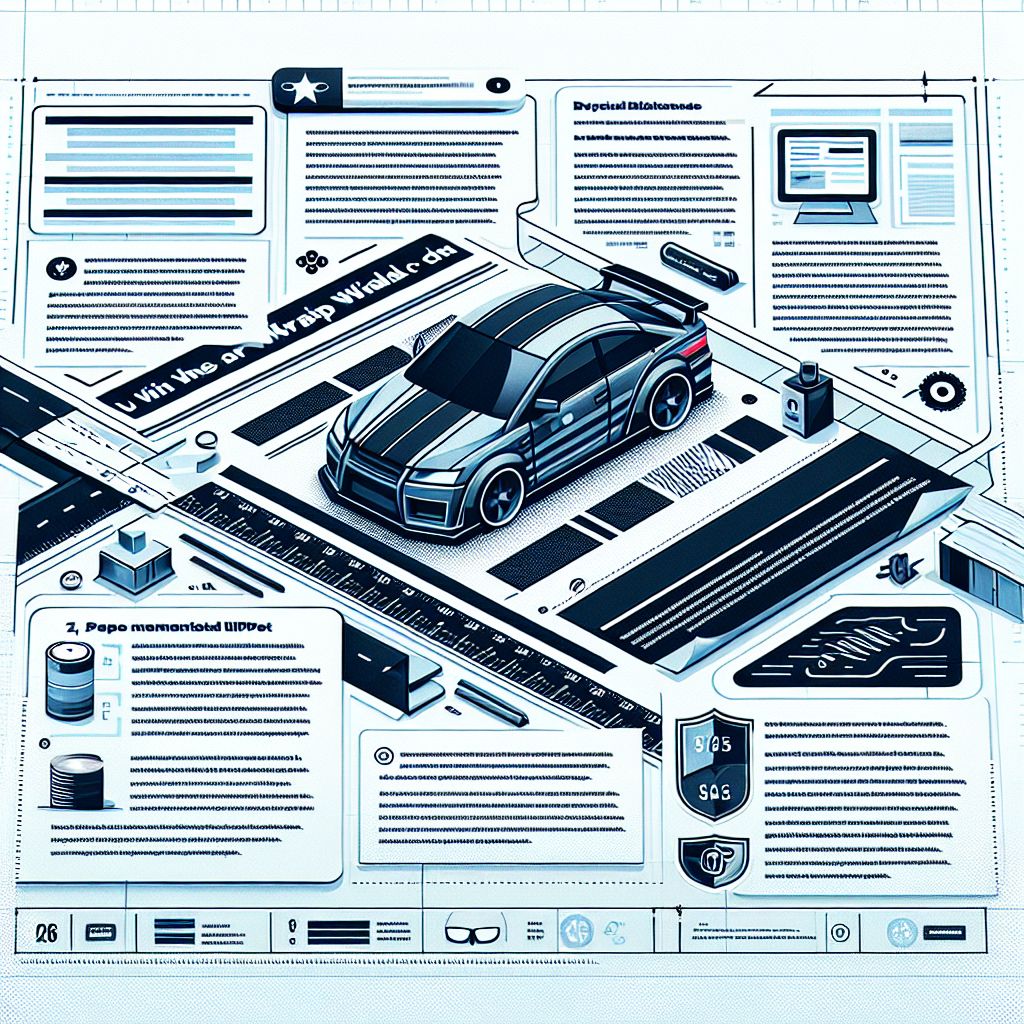
Article-at-a-Glance
- Michigan requires you to inform the SOS and your insurance company about your car wrap.
- Car wraps can change the appearance of your vehicle without a permanent commitment.
- Choosing high-quality materials ensures durability and a professional look.
- Properly installed car wraps can last up to 7 years, making them a cost-effective customization.
- Understanding Michigan’s specific guidelines is crucial for a street-legal and insurable wrap.
Transform Your Ride: Michigan’s Car Wrap Rules
Car enthusiasts, it’s time to transform your ride into a work of art on wheels. But before you get swept away by the endless possibilities of colors and finishes, let’s talk about the rules and regs—because keeping your custom ride street-legal in Michigan is just as important as its killer look. So, buckle up as we dive into the world of car wraps, insurance must-knows, and design regulations in the Great Lake State.
Why Wrapping Your Car is More Than Just Aesthetic
Think of a car wrap as a second skin for your vehicle. It’s not just about looking cool or standing out from the crowd—although, let’s be honest, that’s a big part of the fun. Wrapping your car is a smart move for several reasons:
- It protects the original paint job from scratches, weathering, and UV rays.
- A wrap can be removed, allowing you to revert to the original look or update the design as often as you like.
- If you’re using your vehicle for business, a wrap is an eye-catching way to advertise on the go.
Most importantly, it’s a reversible way to personalize your vehicle without the permanence or cost of a custom paint job.
The Legal Side: SOS Rules for Wrapped Cars in Michigan
Before you start picking out shades and patterns, you need to know the legal side of car wraps. In Michigan, if your wrap changes the color of your vehicle, you’re required to notify the SOS. This isn’t just about bureaucracy—it’s for your benefit. Should your car ever be stolen, the SOS’s records need to match your car’s actual appearance. And yes, this includes wraps that only cover part of your vehicle.h
But it’s not just the SOS you need to keep in the loop. Your insurance company should be informed too. Here’s why:
- A wrap can be considered a modification, and insurance policies have different rules about those.
- In case of an accident, you’ll want the cost of the wrap included in any claims.
- Not telling your insurer might invalidate your policy, which is a headache nobody wants.
Therefore, a quick call to both the SOS and your insurance agent will ensure everything is above board.

The Canvas on Wheels: Understanding Car Wraps
Now that we’ve covered the legalities, let’s get to the fun part—understanding car wraps. A car wrap is a series of vinyl decals that are applied over the body of your car. They come in a range of colors and finishes, from matte to high gloss, and even textures like carbon fiber. You can wrap your entire car, or just go for a partial wrap. Either way, you’re giving your car a brand new look without the commitment of a new paint job.
Choosing the Right Material for Durability and Style
When it comes to car wraps, not all materials are created equal. You want a vinyl that’s going to stand up to the elements, look professional, and last. Here’s a quick rundown on what to look for:
- High-quality cast vinyl is the best choice for a durable, long-lasting wrap.
- Look for brands with a solid reputation, like 3M or Avery Dennison.
- Consider the finish you want, whether it’s matte, satin, gloss, or even textured.
Remember, the better the material, the longer your wrap will look fresh and protect your car’s original paint.
Color-Shifting Wraps: Maintaining Street Legality
Color-shifting wraps are all the rage—they change color depending on your viewing angle and how the light hits them. They’re mesmerizing, but in Michigan, you’ve got to be careful. Some color-shifting effects might be too reflective or mimic official vehicle colors, like those used by law enforcement.
Here’s the bottom line: always check that your wrap meets Michigan’s street-legal standards before you commit. It’s the smart way to keep your car looking cool without attracting the wrong kind of attention.
Notification and Documentation: What the Michigan SOS Requires
Let’s get down to brass tacks: when you wrap your car in Michigan, you’ve got some paperwork to do. It’s simple, really. If the wrap changes your car’s color, you need to update your vehicle registration details. This helps law enforcement identify your car correctly, and trust me, you’ll want that if your car ever goes missing. Just swing by your local SOS with your new wrap details, and they’ll take care of the rest.
Is It Permanent? Clarifying Your Wrap Status with the SOS
One common question is whether a wrap is considered a permanent change to your vehicle. The short answer is no. Wraps are temporary, and that’s the beauty of them! You can switch up your style without a long-term commitment. Just make sure to keep the SOS in the loop if you decide to go back to your car’s original color or switch to a new wrap.
Securing Your Investment: Insurance Must-Knows
Your car’s new wrap is not just a style statement; it’s an investment. And like any savvy investor, you need to protect it. This means having a heart-to-heart with your insurance provider. Ensure they know about your wrap, so it’s covered under your policy. It’s a simple step that can save you big bucks if your wrap-donning car ever gets damaged.
Policy Adjustments for Car Wraps
Because a wrap can be seen as a vehicle modification, your insurance policy may need a tweak. Here’s what you need to do:
- Call your insurance agent and tell them about the wrap. Be specific about the coverage you want for it.
- Ask if your premium will change. A wrap could increase your car’s value, which might affect your rates.
- Get everything in writing. If the worst happens and you need to make a claim, you’ll want proof of your wrap’s coverage.
These steps ensure that your wrap is more than just skin-deep—it’s fully protected.
And if you’re wondering about the cost, it usually doesn’t break the bank. Most insurers will adjust your policy with little to no increase in your premium, especially if the wrap is purely cosmetic. But don’t skip this step—better safe than sorry.
Wraps and Accident Claims: What to Expect from Your Insurer
If you’re ever in an accident, having a wrapped car shouldn’t complicate your insurance claim. As long as you’ve informed your insurer about the wrap, you can expect them to cover its repair or replacement, just like any other part of your car. Be sure to document the condition of your wrap with photos—this will help streamline the claims process.
Design Within Bounds: Michigan’s Guidelines for Wraps
Designing your wrap is where creativity meets legality. Michigan has guidelines on what’s considered street legal, and you’ll want to familiarize yourself with these before giving your car that new skin. For instance, certain reflective materials and colors that could be mistaken for emergency vehicles are no-gos. Stick within the rules to ensure your ride is both stunning and compliant.
When it comes to wrap design, think about:
- The overall look you’re aiming for and how it fits with Michigan’s regulations.
- How the design will work with your car’s lines and curves.
- Choosing colors and finishes that won’t cause visibility issues on the road.
Corporate Branding: Balancing Creativity and Compliance
For those using wraps for business, your car becomes a mobile billboard. This is great for visibility, but remember, your design still needs to meet state guidelines. Keep your branding bold but not so flashy that it distracts other drivers or mimics official vehicles. That balance will get your brand noticed for all the right reasons.
Graphics, Text, and Visibility: Creating a Look that Lasts
Whether it’s a sleek graphic stripe or your business’s logo, you want your wrap’s design to last. Here’s how to make sure it does:
- Pick high-contrast colors for text to ensure readability.
- Use clear, legible fonts for any wording.
- Consult with a professional designer to make the most of your car’s contours.
These tips will help your wrap make a lasting impression, both in looks and durability.
And if you’re ever unsure, a professional wrap installer can guide you through the design process. They know the ins and outs of what works on the road, and they’ll make sure your car turns heads for all the right reasons.
Car Wrap Regulations in Michigan
| Aspect | Description |
|---|---|
| SOS Laws | Familiarize yourself with the laws and regulations governing car wraps in Michigan, as provided by the Michigan Secretary of State (SOS ). These laws may cover aspects such as vehicle modification, visibility requirements, and restrictions on certain types of wraps. |
| Insurance Requirements | Understand the insurance requirements for car wraps set by the Michigan SOS. These requirements may include notifying the insurance provider about modifications to the vehicle’s appearance and any impact on coverage. |
| Design Regulations | Review the design regulations provided by the Michigan SOS regarding the application of car wraps. These regulations may specify guidelines for design elements, such as size, placement, and content, to ensure compliance with state laws and safety standards. |
Reference:
Drive with Confidence: Final Checkpoints Before You Wrap
The Cost-Benefit Analysis: Is Wrapping Right for You?
Before you commit to wrapping your car, consider the costs versus the benefits. A high-quality wrap can range from a few hundred to a few thousand dollars, depending on your vehicle and the complexity of the job. However, the protection it offers your paint, the potential increase in resale value, and the sheer joy of driving a car that reflects your style can far outweigh the initial investment. Plus, it’s a reversible process, so you’re not stuck with it forever.
Professional vs. DIY: Weighing the Options
It might be tempting to wrap your car yourself to save some cash, but unless you’re experienced, it’s best left to the professionals. A poorly applied wrap can look bubbly, uneven, and can even damage your car’s paint. Pros have the right tools and techniques to ensure a smooth, long-lasting finish. Plus, they can help you navigate the legal requirements, ensuring your wrap is fully compliant with Michigan’s regulations.

Frequently Asked Questions (FAQ)
Can I wrap my leased vehicle in Michigan?
Yes, you can wrap a leased vehicle, but you should get permission from the leasing company first. Most companies will allow it as long as the wrap is removed before you return the car, leaving the original paint intact.
How do I maintain my car’s wrap in different seasons?
To maintain your car’s wrap in Michigan’s varying seasons, follow these tips:
- Wash your car regularly with a gentle, soap-free cleaner.
- Avoid high-pressure washes which can lift the edges of the wrap.
- In winter, remove ice and snow carefully to prevent scratches.
- Apply a UV protectant to prevent fading from the sun.
Regular maintenance will keep your wrap looking sharp year-round.
Do I need to remove my vehicle wrap before selling the car?
Not necessarily. If the wrap is in good condition, it could actually be a selling point. However, if it’s looking worn or the buyer prefers the car’s original color, wraps can be removed without damaging the paint underneath.
Are reflective wraps legal in Michigan?
Reflective wraps are legal in Michigan, but they must not be so reflective that they blind other drivers or resemble emergency vehicle markings. It’s best to consult with a professional installer to ensure your wrap meets all visibility and safety standards.
Can a vehicle wrap void manufacturer warranties?
A vehicle wrap itself should not void your car’s warranty as long as it’s installed and removed correctly. However, if the wrap causes damage to the paint or vehicle, it could affect warranty claims related to the paint or body. Always check with your dealer and read your warranty terms carefully before proceeding with a wrap.




